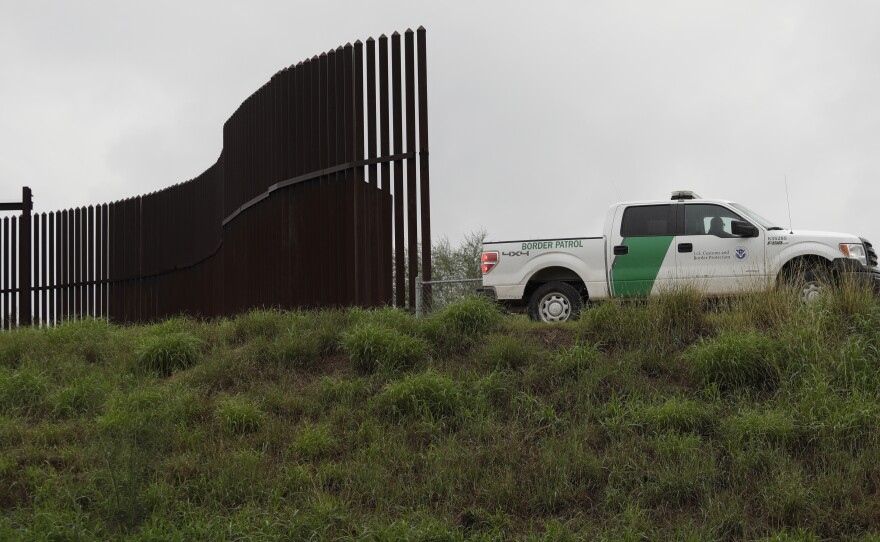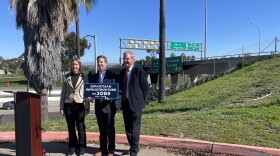Our top story a midday edition memos released this week by the Department of Homeland Security outline the Trump administration's immigration enforcement priorities. The guidelines call for broad enforcement of immigration laws and are expected to lead to the rest the deportation of millions of people living in the country illegally. Part of that plan calls for the hiring of 15,000 agents and 5000 of them to be border patrol. Joining me is Shawn Moran , vice president, National Border Patrol Council welcome to the program. Good to be back. Think it. For many of these new provisions the Department of Homeland Security said it could take months to be formally implemented. What are agents being told about these rules? Right now the rollout has been pretty slow as expected has been varied across the country. Some sectors are still operating under Obama policies whereas other sectors are now starting to get on board with the new directives from the Trump administration. I think there's going to be some growing pains in terms of when and where we see these being rolled out but I think people get on the same page and you will see the policies changing and I think it will have a dramatic benefit to public safety. What do you expect to see the first things we see changed here in San Diego? I think you'll see policy changes as to who will be given a release from border patrol stations or detention facilities pending a hearing before Judge.'s been a priority of the trumpet ministration to end the catch and release. I think that's a first policy that you will see different and having an impact on immigration enforcement. There is a disconnect in the kinds of information we been getting about the number of people crossing illegally into the United States. Border patrol data shows the number of people were making that crossing from Mexico the numbers are fraction of what they were 10 years ago. Why is there a need for more border patrol agents? Big -- If you look at the numbers he did bottom out at 2011 but the numbers have been trending back upwards. We were not in the levels we were at in the late 90s but 500,000 people is still a large number and can have serious impacts if a handful of those people are looking to do harm. We know that the vast majority are coming to this country looking for work but there are gang members and drug smugglers and people that have done time in our prisons and crime aliens looking to cross the border. We need the ages a place to deter that. We are about 60 to 1700 agents down from what our minimum staffing level is supposed to be, which is over 21,000. Obama allow that number to deteriorate and we did not fill those positions so in addition to the 5000 agents that President Trump want to hire we need to fill those positions first. How many of those agents might be assigned to the San Diego area? I think you will probably see a couple of hundred agents come here. We have had retirements and transfers so it's constantly flowing. It has been on the downtrend so we do need to fill positions here but we are not as dire as some other areas due to the amount of traffic we are seeing. Help is needed but not as severe as other places. As you mentioned, there are about 1600 open positions for border patrol agents and they are funded and they are waiting for people to fill the roles of but it's been challenging to get enough qualified people to fill those positions so how challenging would be to hire 6500 new agents? I think it will be difficult. You obviously want the right people in these positions so we want to make sure that we are recruiting from the right democratics -- demographics. We look at military veterans who might be used to working in remote areas and working along the Southwest border because it's not like San Diego everywhere along the border. You do not have the resources that we have here in terms of schools, healthcare, and amenities. It could be spartan at times aware looking for people that can handle that and not leave after few years. Been during the George W. Bush administration when there was a surgeon hiring agents, there was problems that resulted from that. There were ages that were not doing the right thing and there was corruption scandal. Will be better this time who want to become border patrol agents? When it comes to agents, yes, we are in favor of extreme betting. Hopefully we learn from the mistakes. We had a lack of leadership in customs and border protection and at the senior levels of the border patrol they refuse to stand up to the White House and say this cannot be done in a safe manner as quickly as a White House wanted it. They just stood up and saluted and said we would get it done. That resulted in Academy program being curtailed. They cut it down so we don't want to cut corners. We want to make sure that people are having background checks completed before being put out on the field. It's common sense but it was lacking in 2000 for and the union felt that we were bringing our heads against the wall because these were arguments that we were making then. So one last question. The Department of Homeland Security is the directing border patrol to reach out to local law enforcement and maybe have signed test site agreements. What is the union stance on these agreements and how do you think that will go down in San Diego? We look forward to working with every law enforcement organization that we can. I think at the tactical level we have great relationships with Seneca Police Department and the other local law enforcement and also the California Highway Patrol. The problem gets when you get to the higher levels in DHS. I believe the program could be a valuable tool and I believe the secure committees program is a very passive program. They run somebody through the national crime information computer and that interfaces with both the FBI databases and immigration databases and let them know if someone is in the country illegally and have been previously caught by border patrol or ice and make sure they're held until they either fulfill their term of incarceration for the state or they get in touch with the border patrol agent and make sure that person is removed from the country. I've been speaking with Shawn Moran , -- , vice president, National Border Patrol Council. Thank you so much for your time. Thank you. Always a pleasure.
President Trump wants to hire 5,000 more Border Patrol agents and 10,000 more Immigration and Customs Enforcement (ICE) officers to enforce his executive orders on immigration.
It wont be easy.
Homeland Security Secretary John Kelly was blunt when asked by a member of Congress about it. He said he will add to the ranks "as fast as we can."
But he quickly added, "we will not lower standards and we will not lower training." Kelly then said he didn't believe "we're going to get 10,000 and 5,000 on board within the next couple of years."
The Border Patrol is part of Customs and Border Protection (CBP), which enforces the law at the border. ICE officers enforce immigration and customs laws in the U.S. interior.
The number of CBP agents doubled during the George W. Bush and Barack Obama administrations, from 10,000 to 21,000. But there were problems. New agents were rushed through training and into the field, some without completed background checks.
"You have to make sure that no red flags come up in someone's background before you're putting them in a position like this," says Shawn Moran, vice president of the National Border Patrol Council, the union that represents Border Patrol agents.
Moran says it will be "difficult but not impossible" to find 5,000 new agents, adding that when it comes to hiring and training border patrol agents, "we are fans of extreme vetting to make sure that we get the right people."
Yet Moran thinks one part of that vetting is too extreme: the polygraph exam that candidates have to undergo. He calls it flawed and overly burdensome, and says it excludes a higher percentage of candidates than at any other federal agency where polygraphs are used.
The AP reported that 2 out of 3 applicants fail the exam.
The test can run eight hours, Moran says, and "is excluding qualified candidates from being Border Patrol agents."
James Tomsheck, former head of internal affairs at CBP, defends the test. He told NPR's Morning Edition it weeded out candidates who had criminal backgrounds and some would-be agents who were members of drug cartels that wanted to infiltrate CBP as spies.
Tomsheck says there have been efforts to remove some questions from the exam, which he says "is beyond my comprehension."
In the past, CBP has also had a problem retaining Border Patrol agents.
The agency is now down some 1,600 agents from the 21,000 it's authorized for.
Jay Ahern, a former CBP official now with the private security firm the Chertoff Group, says one problem is sending new recruits to distant outposts. "When you recruit somebody, let's say from Boston, and that person's gone through the six months of the hurdle [of the] hiring process, and you offer them a job in Del Rio, Texas and they realize what it's like when they get to Del Rio," Ahern says, they realize "this isn't what I expected it to be."
Ahern says additional Border Patrol agents are very much needed, but that it's going to take time to recruit and hire them, administer medical exams and drug screening, fitness tests and training. "To get somebody delivered on the border," Ahern says, takes a significant period of time, and is "not something that should be compromised."
Even if the process began today, it could take a year or more to bring a new agent on board.
Copyright 2017 NPR. To see more, visit http://www.npr.org/.






